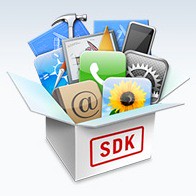 The iTunes App Store’s control over developers is notoriously binding, so none of them really expected any fancy business model to emerge. Online, nobody knows you are a dog, and people are OK to pop $.99 for something with a funny name and a promising screen cap. If you actually plan to make a living from more than $5, and you’re a developer and you were not one of the three games featured at the Jobsian App Store launch… Too bad!
The iTunes App Store’s control over developers is notoriously binding, so none of them really expected any fancy business model to emerge. Online, nobody knows you are a dog, and people are OK to pop $.99 for something with a funny name and a promising screen cap. If you actually plan to make a living from more than $5, and you’re a developer and you were not one of the three games featured at the Jobsian App Store launch… Too bad!
So the other solution was to launch two versions: a demo, usually called Lite, and the other one with a price tag and more levels. That was cool, it boosted the Store Stats, and everybody was happy: those who wanted free apps, and developers who wanted to get the word out about their apps.
Some priced their app at a very low price for a (undisclosed) while, hoping the masses will rush to the offer. If you ask the experts, it’s actually a very good trick because when confronted with a five-star scale, people tend to give a rate based on the quality/price ratio. Early adopter therefore give presumably better reviews, and they influence the future reviewers — but I guess lowering price will only force competitors to do the same, and having to choose between raising prices (and loosing all to the still cheaper competition) or keeping some cash coming in, many more than initially expected might keep those low prices.
That is all good for Apple, that has a great platform with low prices (profits are made on the device, remember?) but it gives little hope to the aspiring developer confronted to a harsh competition.

Many apps allow you to get some formatted content, but none have a simple way to make money through it, because Steve won’t allow it. More importantly, many woud prefer some control over branding (CSS) and are still rebutted by the SDK. Any lawyer out there that understands the SDK and can find a loophole?